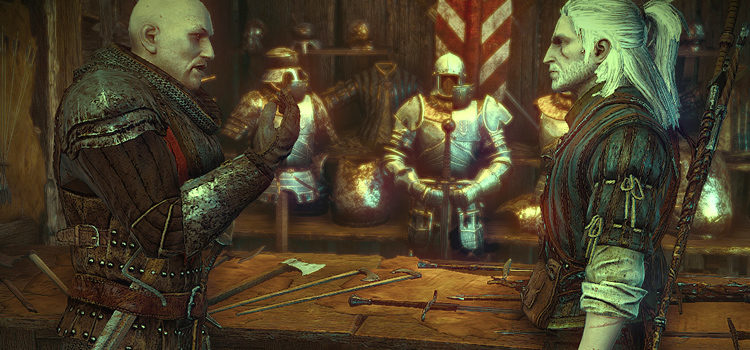The Best Dynasty Legacies in Crusader Kings 3, Ranked
This post may contain affiliate links. If you buy something we may get a small commission at no extra cost to you. (Learn more).
CKIII at its core is a game about your dynasty.
Your overall goal is to make your dynasty as successful as possible.
While you do not have full control over all characters that comprise your dynasty, you can still influence them in various ways. The most impactful way is through dynasty legacies.
Dynasty legacies are unlocked by spending renown, a resource that is collected by all dynasty members and can be spent by the dynasty head. If you’re not the dynasty head, you sadly will have to make do with the AI’s choice of legacies.
All dynasty legacies offer interesting bonuses and are all fine to pick. So you can usually just pick the one that best fits your current playthrough’s vibes.
But for this ranking, I’m covering the 8 legacies available to all characters (the “Customs” one needs the Royal Court DLC).
8. Customs

Let’s get the one legacy locked behind a DLC out of the way first. The Customs legacy gives you some nice bonuses regarding the management of a multicultural realm.
It will make learning new languages easier and increase the cultural acceptance with other cultures in your realm. The third legacy also gives a nice bonus to your cultural fascination progress, providing some much needed technological advantage.
The final two legacies unlock a unique court position, “Cultural Emissary” and a unique decision “Celebrate other Cultures” respectively.
The court position significantly increases the opinion of different cultured characters, while the unique decision gives temporary bonuses to different cultured counties in your realm.
All in all, some nice quality of life bonuses for any playthrough where a multicultural realm needs to be managed. But if for some reason you’re painting the map in your realm’s color, the Customs legacy will find even more value!
You can’t culture convert everything.
7. Law

The Law legacy is a “jack of all trades, master of none” type of situation.
The bonuses provided range from a popular opinion increase to defender advantage in owned territory.
There are lots of cost reductions:
- Cheaper feasts and hunts
- Title creation
- And reduced construction cost and time
These can be translated to money saved. Although money is rarely a problem after the early game.
The increase to stewardship lifestyle experience is nice, but stewardship isn’t a lifestyle you will be picking consistently, unless playing super tall. The increase to powerful vassal opinion in the 4th legacy is always welcome.
Either way, the Law legacy culminates in a +1 increase to your domain limit, and a nice +5 defender advantage in controlled territory. This is a very nice bonus, and tall players will drool over seeing the domain limit increase.
Consider this legacy if you’re aiming for a strong domain.
6. Kin

Kin provides some nice buffs to your family’s opinion of you, makes you a better educator for your children, and buffs your long-lived characters with extra skills.
Granted, the first three segments of the tree are rather lackluster, providing miscellaneous bonuses related to close family opinion, as well as a good amount of disease resistance.
The final two segments provide the major bonuses you may be looking for:
A +5 dynasty opinion and a +10 close family opinion, along with a big increase to personal scheme success chance against dynasty members – which can help immensely with keeping your vassals in check upon succession.
As most of your vassals will be members of your dynasty (if you are doing things right), the extra bonus to their opinion of you is significant. The close family opinion is important upon succession, as it can potentially save you a rebellion from your siblings who would covet the throne otherwise.
The final bonus is an altering of game mechanics, providing no prowess loss with age and random skill points as characters age beyond 30. You’ll also see your dynasty’s members actually age slower in their portraits!
5. Glory

Glory is all about diplomacy and prestige.
It’s a great way to increase stability in large realms in the late game, especially with the “lesser realm stability” game rule turned on.
I recommend turning it on if you find the game too easy; it’s even fully compatible with ironman and allows achievements.
The tree opens with a +30 to marriage acceptance and nothing else. This might seem lackluster, but believe me, it’s not. It can help you and your dynasty secure some clutch alliances, and set your heirs up for inheritance in foreign realms!
The next couple entries on the Glory legacy offer nothing substantial either, providing some minor bonuses to various stuff, including a notable +1 to number of knights.
The final two segments of Glory are where the legacy takes off. There you can find various bonuses that will increase your vassal limit, make your vassals rebel less, and allow you to have two personal schemes active simultaneously.
Among the bonuses is a plain +10 to general opinion.
All in all, a great option if you are going for an empire spanning large swaths of land. The more vassals under you, the more value this legacy will find.
It starts weak though, so you will have to be patient with this one.
4. Guile

Ever wanted to play as a tyrannical overlord feared by everyone?
Well, with the Guile legacy you can make it a reality for your entire dynasty!
The Guile legacy is all about ruling through fear and scheming. It opens with an increase to natural dread and dread gain.
A simple bonus that alone doesn’t have much value. The next segment provides a +10 hostile scheme success chance and halves the cost of bribing agents.
The third one boosts scheme secrecy and increases intrigue lifestyle experience. This is great, as the guile legacy works best on characters who go down the path of intrigue. I’d argue that if you’re going for this legacy, you should play most (if not all) your characters with a focus on intrigue.
The fourth entry gives a passive monthly decrease to tyranny and makes your intimidated vassals and terrified vassals provide more tax. This all synergizes perfectly with the “Torturer” tree in the intrigue lifestyle.
Lastly, a 77% chance to prevent a murder against every single dynasty member is given. Ironically, this can work against you when plotting against your own dynasty!
The Guile legacy’s icing on the cake is the doubling of interaction acceptance against intimidated and terrified characters. This is huge, allowing you to make absurd demands against terrified characters.
This legacy allows for a unique playstyle, and I recommend trying it out at least once!
3. Warfare

CKIII isn’t all about war. Yet war is undoubtedly a major part of the experience.
The Warfare legacy buffs your military capabilities in every way imaginable.
There’s not much to say about it. The buffs are nicely spread among the legacy segments, with each new unlock making you a tad bit stronger militarily.
The highlight is the fourth segment which provides a +5 advantage along with a +15% to men-at-arms’ counter efficiency.
The house guard men-at-arms unlocked by the final segment are a strictly better heavy infantry unit than the regular one. They’re even better than most culture-specific heavy infantry variants. They are limited to one regiment though.
Generally, I’m not a fan of pure military buffs. But I cannot deny Warfare legacy’s power. Just note that even if you’re focusing on other lifestyles, these bonuses apply to your entire dynasty.
While you may be focusing on learning and chilling in the capital, your martially educated siblings and cousins will also enjoy many of the bonuses the legacy provides, and so will your men-at-arms.
Do not be afraid to pick this legacy in the early game if you know that you’re going to find yourself in a lot of wars.
2. Erudition

Well, what can I say… I’m a sucker for learning in this game.
Erudition, despite its name, provides various bonuses and doesn’t exclusively focus on learning.
It will make recruiting guests cheaper, while also increasing the quality of random guests in your court. The +10 bonus to your whole court’s opinion lowkey protects you from schemers looking for agents close to you.
Most of the other minor bonuses are related to piety and clerical opinion, all of which synergize well with each other and the learning lifestyle focus. A +20% to development growth offers something to those players who love playing super tall.
Two more bonuses that stand out from the rest:
- +10% Effectiveness of Councilor Tasks in the final entry
- +10% learning lifestyle experience in the third entry
Your councilors should usually be the best in their respective attribute. A buff to culture and religion conversion speed is always nice. Faster cultural acceptance, control increase, and a bigger opinion bonus from the internal affairs task are only a few of the potential applications.
The extra learning lifestyle experience is awesome, as many of your characters will be focusing on learning if you are your culture’s head (which you should almost always be).
1. Blood

CKIII is considered by many players to be a eugenics simulator.
Well that might be a meme, but there’s a hint of truth to the whole notion.
Your overall goal is your dynasty’s success, having superb specimen in it is something you are going to look for.
The Blood legacy gives you an easy way to do just that. Its whole schtick is to make your life easier when it comes to eugenics.
Every segment has to do with the inheritance of congenital traits, making it more likely to inherit good ones and less likely to get bad ones.
The fourth segment allows you to choose a trait to make it more common in your dynasty. You could go for the bland option of picking genius or herculean, sure, but you could also go with giant or dwarf. What’s better than a dynasty full of genius and beautiful dwarves?
The final segment buffs your characters’ life expectancy by a flat 5 years. That’s cool, and can lead to some stupidly long-lived characters when combined with certain character traits & a focus on learning.
With the correct setup, you can begin ruling as a child, and keep the character alive all the way to 120 years old.
Note: Women have an innate bonus to health in CK3, making them a better choice when attempting something like this.
Ruling for more than a century as a genius, beautiful, albino lady is the closest you are getting to vampiric rule in vanilla CK3. For the time being at least.






